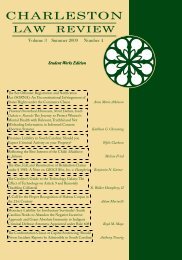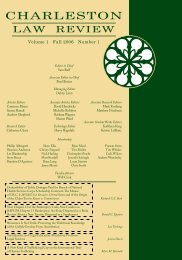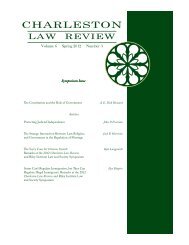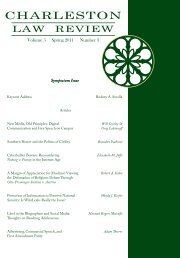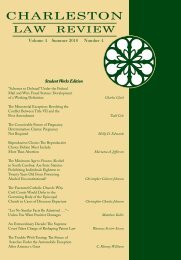Volume 5 Winter 2011 Number 2 - Charleston Law Review
Volume 5 Winter 2011 Number 2 - Charleston Law Review
Volume 5 Winter 2011 Number 2 - Charleston Law Review
You also want an ePaper? Increase the reach of your titles
YUMPU automatically turns print PDFs into web optimized ePapers that Google loves.
SCHULZE FINAL.doc1/20/<strong>2011</strong> 6:14PMCHARLESTON LAW REVIEW [<strong>Volume</strong> 5training students to reflect consciously about what it means to bean ethical and moral lawyer. 75 <strong>Law</strong> school education shouldfocus not only on the substance of the law, but also upon givingstudents the tools to develop as professionals. 76Professor Glesner Fines’s third principle of the humanizingmovement centers upon problem-solving and justice. 77 ToStudents: Bridging the Generation Gap, 15 CLINICAL L. REV. 255, 259–61 (2008)(describing the varied learning traits of Millennial, Generation X, Baby Boomer,and GI generation members and applying those traits in the context ofexternship).75. Steven K. Berenson, Educating Millennial <strong>Law</strong> Students for PublicObligation, 1 CHARLOTTE L. REV. 51, 66–70 (2008).76. Illustrating this principle leads one to consider a frequently discussedquirk about law school learning. For decades, first-year students complainedthat legal education forced them to divorce themselves from emotion, morality,and their intrinsic sense of what is just. See Todd David Peterson & ElizabethWaters Peterson, Stemming the Tide of <strong>Law</strong> Student Depression: What <strong>Law</strong>Schools Need to Learn from the Science of Positive Psychology, 9 YALE J. HEALTHPOL’Y L. & ETHICS 357, 379 (2009). Instead, they were told that proper legalargumentation eschews “feelings” or “emotions” and instead requires relianceupon pure, objective, rational justifications. See id. Indeed, legal thinking doesrequire one primarily to assert arguments directly related to purely objectivejustifications—focusing upon the plain meaning of a statute, or upon caseprecedent. But, that mandate does not require resort solely to objectiverationalism, to the exclusion of arguments based upon “justice.” For decades,law schools have churned out lawyers too devoid of any connection to commonsense or to a community’s sense of justice. This has led to absurd examples oflawyers presenting arguments with strict adherence to objective rules, butignoring the fact that their non-lawyer clients or non-lawyer jurors still retaincommon sense.For instance, a few years ago, the lawyers representing theArchdiocese of Boston in litigation alleging sexual abuse by priests included intheir Answer to the Complaint an affirmative defense that garnered widespreadcondemnation. The Answer stated that the plaintiffs’ damages, if any, werecaused by the negligence of the plaintiff —an alleged victim of child sexualabuse—or his parents. Although there is no doubt such an affirmative defensewould serve most defendants in a tort action well, in this case it was aquestionable tactic, and Cardinal Bernard <strong>Law</strong> receded from it both indeposition and by amending the Answer to strike the affirmative defense. SeeDeposition of Cardinal Bernard <strong>Law</strong>, BOSTON GLOBE (Oct. 16, 2002),http://www.boston.com/globe/spotlight/abuse/shanley/law_deposition/101602_entire.htm.A humanized legal education both attempts to indoctrinate theclassical view of the (allegedly) rational, objective nature of law, and helps todevelop a student’s sense of practicing law with a retained sense of decency andmorality (albeit subjective).77. Professor Glesner Fines actually uses the phrase “Peace and Justice.”292



